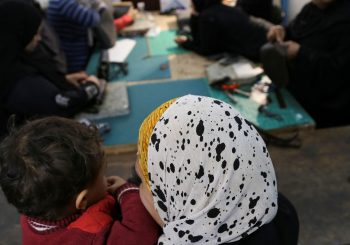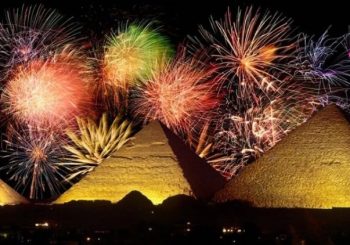By: Abdelrahman Amr and Michael Matthiesen.
In the fourth part in an Egyptian Streets article series under the name of East-West Chitchat that aims to spark increased dialogue between Americans and Egyptians, Abdelrahman Amr and Michael Matthiesen explore media coverage variations in Egypt and the United States of the 25th January revolution.
The US and Egypt have uniquely problematic, rightfully complained about cultures surrounding each countries news coverage. Americans live in a constant state of fear generated by a tsunami of negative news from privately owned news organizations. Egyptians have a government-controlled news cycle that only covers stories with a government approved spin on it. The contrast between both countries is especially evident to the 2017 World Press Freedom Index, which ranks the US at #43 and Egypt at #167 in terms of their of freedom of expression.
Americans may have more freedom of expression than Egyptians, but that doesn’t mean they use it properly. American news is probably both the most innovative and ridiculous system in the world. It is the privatization of news that has led to the American free and independent press to become known as “The Fourth Estate” of the American political system, spawning media practices that have become popularized and emulated around the globe. NBC became the first news network to have a regularly scheduled news program in the 1940s. CNN started the 24-hour news cycle and also initiated what is now called “The CNN effect,” which is the act of televising graphic images of human rights abuses in order to compel policymakers to act. The expansion of the internet and the rise of blogs like the Huffington Post, Politico, the Drudge Report, and Breitbart has enabled people to get access to news for free, upending a system where previously readers had to pay for access.
An issue with the vast choice in news options in the US is it has led to Americans only picking news outlets that support their opinion, and a population that isn’t operating on a single set of well-defined facts.
The best illustration of the difference between news in the US and Egypt is how each news system covered the 2011 Revolution in Tahrir Square. Regardless of the news source, the Egyptian Revolution in 2011 was something that captured the attention of all American news outlets. CNN had wall-to-wall news coverage of the events in Tahrir Square. Americans were glued to their television trying to see if the protests in Tahrir would amount to any newfound freedom from Mubarak’s 30-year reign. The following Occupy Movement even cited Tahrir Square as inspiration for their own protests.
On the other hand, while there were thousands of Egyptians protesting in Tahrir square on the 25th of January 2011, Egyptian state TV channels decided to ignore the protests and instead presented its viewers tranquil live footage of the river Nile and an empty 6th of October bridge. They continued in this vein for a number of days in the midst of the revolution.
Seven years later, this mentality has not changed. Though mainstream media is forced to cover the current events that can’t be overlooked, there is only one narrative that Egyptians can watch, which is the government-approved story. This forced outlook left media representatives who went in the opposite direction sidelined leaving viewers with uniform messages. It’s hard to spot a difference when you’re flipping through various channels.
Given that during the Revolution, Egyptians had no internet connection and were forced to consume television for their news. Choices were limited to Egyptian state and privately-owned media that supported the government, or Qatar’s state-funded Al Jazeera, which painted a more sympathetic picture of the protesters and helped draw international attention to events on the ground, most Egyptians were forced to see the revolution through these narratives alone.
The scene completely changed after Mubarak stepped down and Egypt opened up to new sources of news coverage, including a number of contemporary, forward-thinking online websites and TV channels. In spite of this, mass media outlets were still mostly controlled by businessmen close to the government. During the numerous events that followed the revolution, citizen journalism spiked and news outlets dedicated new approaches, like Whatsapp numbers, for contributions from first-hand witnesses. However, as a new political wave overwhelmed the country in 2013, the free flow of information is even more hindered now with speculations on how the future of news coverage will be in the country.
About 500 websites are currently blocked in Egypt, without solid legal grounds, including news outlets, personal blogs, international human rights organizations’ web pages and until recently, the famous blogging platform, Medium. In conjunction with this virtual wall, the government recently proposed a cybercrime bill that sparked a huge debate, while the Prosecutor General ordered senior prosecutors to take legal actions against media and social media content to combat fake news, a vague term popularized after the 2016 U.S Election. The new unclear bill could even result in a fake news snitching hotline. Additionally, the Minister of Telecommunications proposed developing an ‘Egyptian Facebook’ which can be a much easier way for the government to monitor and handle online content. Such grim policies will hugely affect the way 50 million internet users in Egypt receive and interact with the news.
News cultures are different everywhere and there are greater contrasts in news culture than the U.S and Egypt, but in a world plagued by fake news, there are overlaps. Both Presidents Trump and Sisi are leading a charge of restricting freedom of the press through the spectre of “fake news.” Though fake news is a problem, the restrictions they’re taking don’t actually reduce the number of false stories published, they just punish the news outlets that publish stories they don’t approve of. Allowing our leaders to continue to attack the press leads to democratic backsliding – or the moving away from a liberal democratic society. To continue to allow democratic backsliding to occur would allow more freedoms, other than freedom of expression, to be taken away or reduced. Therefore, it is up to people to participate in citizen journalism and hold our leaders accountable for the stories they don’t like – instead of just letting them call it fake news. As the Washington Post now states on every issue, “Democracy Dies in Darkness.”







Comments (0)